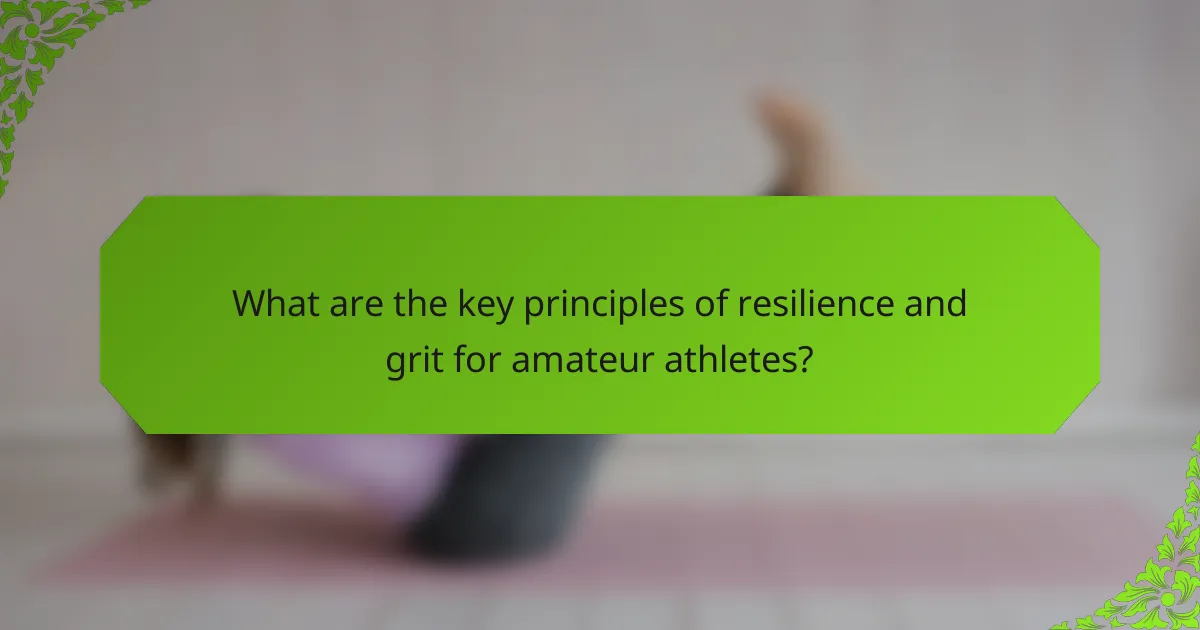Building self-discipline is crucial for amateur athletes aiming to enhance their performance and mental resilience. This article explores effective self-discipline books that provide practical strategies, relatable anecdotes, and actionable exercises. Key concepts such as goal-setting, routine development, and overcoming mental barriers are highlighted. By applying these principles, athletes can cultivate grit and improve their overall athletic experience.

What are the key principles of resilience and grit for amateur athletes?
Self-discipline, resilience, and grit are essential for amateur athletes to succeed. These principles enable athletes to overcome challenges and maintain focus.
Resilience involves adapting to setbacks, while grit emphasizes perseverance in the face of obstacles. Both qualities can be cultivated through consistent practice and mental training.
Key strategies include setting clear goals, maintaining a growth mindset, and developing routines that reinforce discipline. Reading self-discipline books can provide valuable insights into these principles and offer practical exercises.
Incorporating these principles can lead to improved performance and greater satisfaction in athletic pursuits.
How does self-discipline contribute to athletic performance?
Self-discipline significantly enhances athletic performance by fostering consistency in training, focus during competitions, and resilience in overcoming challenges. It cultivates mental toughness, allowing athletes to push through discomfort and setbacks. Books on self-discipline offer strategies for building these essential traits, helping amateur athletes develop grit and maintain motivation. Research shows that disciplined athletes are more likely to reach their goals, as they adhere to training regimens and prioritize their physical and mental well-being.
What role do self-discipline books play in developing mental toughness?
Self-discipline books significantly enhance mental toughness by providing strategies and insights for amateur athletes. These books emphasize the importance of grit and resilience, helping athletes develop a strong mindset. Techniques such as goal-setting, time management, and self-reflection are common themes. As a result, readers can cultivate persistence and focus, essential attributes for overcoming challenges in sports. By consistently applying the principles found in these books, athletes can foster a unique mental toughness that sets them apart in their performance.

What are the universal attributes of effective self-discipline books?
Effective self-discipline books for amateur athletes share universal attributes that enhance grit, resilience, and mental toughness. Key attributes include practical strategies, relatable anecdotes, clear frameworks, and actionable exercises. These elements help readers apply concepts to their training and daily routines. Additionally, strong self-discipline books emphasize accountability and goal-setting, fostering a mindset conducive to sustained effort and improvement.
What core features should amateur athletes look for in self-discipline books?
Amateur athletes should seek self-discipline books that emphasize practical strategies, goal-setting techniques, and mental resilience. Look for titles that provide actionable exercises, real-life examples, and insights into developing grit. Books should also address common challenges athletes face, such as maintaining motivation and overcoming setbacks. Unique attributes like personalized coaching tips or proven frameworks for building mental toughness can enhance the learning experience.
How can these books enhance focus and commitment?
Self-discipline books for amateur athletes enhance focus and commitment by providing actionable strategies and mental frameworks. These books teach techniques for setting goals, managing time, and cultivating resilience. For example, they often include exercises that promote grit, helping athletes stay dedicated during challenging training sessions. Additionally, they emphasize the importance of a growth mindset, encouraging athletes to view setbacks as opportunities for improvement. This shift in perspective fosters long-term commitment to their athletic journey.

What unique strategies do top self-discipline books offer?
Top self-discipline books for amateur athletes offer unique strategies that enhance grit, resilience, and mental toughness. These books emphasize goal-setting techniques, the importance of routine, and the power of visualization. They often include actionable exercises that promote accountability and self-reflection. Additionally, many provide insights into overcoming mental barriers, fostering a growth mindset, and leveraging peer support for sustained motivation.
What techniques for building resilience are highlighted in popular titles?
Self-discipline books for amateur athletes emphasize techniques for building resilience such as goal setting, visualization, and positive self-talk. These techniques foster mental toughness and grit, enabling athletes to overcome challenges. Popular titles highlight the importance of consistency in practice and learning from failures as key aspects of resilience. Additionally, developing a growth mindset is frequently discussed, encouraging athletes to view obstacles as opportunities for growth.
How do visualization and goal-setting improve performance?
Visualization and goal-setting significantly enhance performance by providing clear targets and mental frameworks. Visualization helps athletes mentally rehearse their performance, improving focus and confidence. Goal-setting establishes measurable milestones that motivate progress and accountability. Together, these strategies foster mental toughness, essential for amateur athletes aiming to build resilience and grit.
Which authors are renowned for their insights on grit and resilience?
Angela Duckworth, Carol Dweck, and Ryan Holiday are renowned authors for their insights on grit and resilience. Angela Duckworth’s book “Grit” emphasizes perseverance and passion for long-term goals. Carol Dweck’s “Mindset” explores the growth mindset, which fosters resilience in the face of challenges. Ryan Holiday’s “The Obstacle Is the Way” discusses turning adversity into advantage, highlighting the importance of mental toughness. These authors provide valuable perspectives for amateur athletes seeking to build self-discipline and mental fortitude.

What rare attributes can elevate self-discipline books for athletes?
Unique attributes of self-discipline books for athletes include practical exercises tailored for sports, insights from elite athletes, and a focus on mental recovery techniques. These elements enhance the application of self-discipline principles in athletic contexts. Incorporating case studies of successful athletes who have implemented these strategies can further elevate the content’s relevance and impact. Additionally, books that offer personalized goal-setting frameworks can provide athletes with actionable plans, making the concepts more relatable and effective.
What uncommon practices do elite athletes recommend?
Elite athletes often recommend unconventional practices such as visualization, mindfulness meditation, and unconventional training methods. These practices enhance mental toughness and resilience, crucial for overcoming challenges. For example, visualization techniques help athletes mentally rehearse performance, boosting confidence. Mindfulness meditation improves focus and reduces anxiety, fostering a calm mindset during competition. Additionally, some athletes adopt unique training regimens, like incorporating functional movements or unconventional equipment, to build adaptability and grit.
How do these books address mental health challenges in sports?
Self-discipline books for amateur athletes address mental health challenges by promoting resilience and mental toughness. These books provide strategies to manage stress, enhance focus, and build a positive mindset. Techniques such as visualization and goal-setting are emphasized, helping athletes navigate pressures and setbacks. Furthermore, they often include real-life examples, illustrating how mental discipline contributes to overall performance and well-being.

How can amateur athletes apply lessons from self-discipline books?
Amateur athletes can apply lessons from self-discipline books by developing consistency, setting clear goals, and fostering resilience. These books often emphasize the importance of routine, which can help athletes maintain focus during training.
Additionally, self-discipline literature provides strategies for overcoming mental barriers, encouraging athletes to push through challenges. For example, techniques such as visualization and positive affirmations can enhance mental toughness.
By integrating these principles into their training regimens, amateur athletes can build grit and improve performance. This approach not only aids in athletic pursuits but also cultivates a mindset beneficial in various life aspects.
What are the best practices for integrating these concepts into training?
To effectively integrate self-discipline concepts into training for amateur athletes, focus on structured routines and goal-setting. Establish a consistent reading schedule for self-discipline books, ensuring athletes engage with the material regularly. Encourage discussions around key concepts to foster understanding and application. Utilize practical exercises from the books to reinforce lessons on grit, resilience, and mental toughness. Monitor progress through self-reflection journals, allowing athletes to track their growth and challenges.
What common mistakes should athletes avoid when reading these books?
Athletes should avoid overgeneralizing advice, neglecting personal experiences, and skipping practical application. Misinterpreting concepts can lead to ineffective training. Failing to integrate lessons into routines diminishes the potential benefits of self-discipline books. Additionally, ignoring the importance of mental resilience can hinder overall performance.
How can athletes measure their progress in building resilience and grit?
Athletes can measure their progress in building resilience and grit by tracking specific mental and emotional metrics. Key methods include journaling experiences, setting incremental goals, and assessing responses to challenges. Regular self-reflection enhances awareness of growth in mental toughness. Engaging with self-discipline books provides strategies to reinforce these skills.
What expert insights can enhance the application of these strategies?
Expert insights emphasize the importance of applying self-discipline strategies consistently for amateur athletes. Engaging with books that focus on grit, resilience, and mental toughness can provide actionable techniques. For instance, integrating daily practice routines enhances retention of learned principles. Additionally, setting specific, measurable goals can help track progress and maintain motivation. Research indicates that visualization techniques can improve performance, making them a valuable addition to training regimens. Finally, seeking mentorship or accountability partners can reinforce discipline and provide support throughout the journey.



